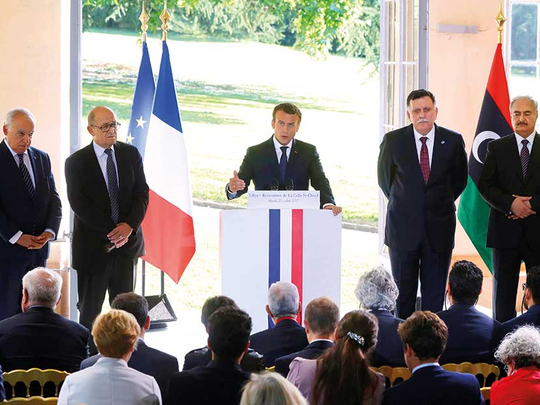
Cairo: Italy’s plan to dispatch naval boats to help strife-wracked Libya combat illegal migration will most likely widen rifts in the country, Libyan experts have said.
Last week, the Italian parliament voted for a government plan to deploy military vessels along the Libyan coast, prompting Khalifa Haftar, the chief of the army in eastern Libya, to order his forces to attack foreign non-commercial vessels entering the country’s waters without permission.
“This warning [from Haftar] preserves Libya’s sovereignty,” said Amer Abu Dawia, a professor of political science at the Tripoli University.
“Italy has made a mistake by taking the side of one party in Libya,” he told Gulf News, noting that the Italian move came with arrangement with Fayaz Al Sarraj who leads the UN-backed Government of National Accord that is not recognised by an elected parliament backing Haftar.
“The Italian step has dismayed the Libyans and revived in their minds the bitter legacy of Italian colonialism.”
Italy colonised Libya for more than three decades staring from 1911.
Rome has defended its decision to send warships to Libya, saying their mission will be limited and is aimed at providing logistical and technical support to Libyan coast guards for stemming illegal migration.
The operation was agreed at talks between Al Sarraj and Italian Prime Minister Paolo Gentiloni in Rome last month.
The talks followed a ground-breaking meeting brokered by French President Emmanuel Macron outside Paris between Haftar and Al Sarraj. Both Libyan rivals committed themselves at that meeting to a nationwide ceasefire, excluding fight against terrorist groups, and to hold legislative and presidential elections next year.
Libya has slid into anarchy since the toppling and killing of longtime autocrat Muammar Gaddafi in a 2011 uprising.
“Italy’s interference in Libya’s affairs dispels optimism raised by the meeting of Haftar and Al Sarraj in Paris,” Omar Al Seedqi, a Libyan political researcher in Cairo said.
“Now Haftar is presenting himself as a defender of Libya’s dignity and all of its lands while Al Seraj is regarded as have brought the Italians back to the country. This will just pour oil on tensions in Libya,” Al Seedqi told Gulf News.
“Haftar’s threat to target Italian vessels is basically unrealistic because his naval forces are based in the east while the focus of the Italian naval units will be in the west. However, the Italian presence will justify any plan by Haftar to expand his influence in the country. “
In recent months, Haftar’s loyalists have gained ground from Islamist militants and competitors in several parts of the divided country and raised the army general’s political profile.
The pro-Haftar parliament based in Libya’s east has called the Italian operation a “violation of national sovereignty” and said Al Sarraj’s government has no legal mandate to seal the contested deal with Italy.
Al Sarraj has also come under fire from his backers over the Italian naval deployment.
“This is a flagrant breach of the Libyan sovereignty,” said Fathi Al Mijabri, a member of the Presidency Council led by Al Sarraj.
“Al Sarraj has acted individually in a way that does not represent the Presidency Council or the Government of the National Accord,” Al Mijabri added in a statement.
He denounced what he called “Italy’s involvement” in the North African country.
“The government of Mr Gentiloni has to realise that relations between the Libyan and Italian peoples are deeper and more important than a move aimed to make immediate and transient political gains.”
Dozens of Libyans Friday rallied in Tripoli, the seat of Al Sarraj’s power, in protest against his agreement with Rome.
Post-Gaddafi Libya has become a major hub for people-smugglers and illegal migrants seeking to reach Europe aboard shipwrecks. Italy, the main destination of this influx, has borne the brunt.











